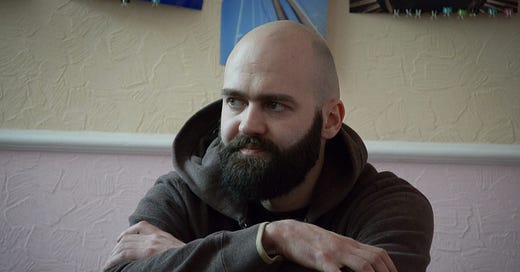
Dmytro Filimonov, 41, is a Ukrainian journalist based in Kyiv. He was one of the first reporters to travel to the separatist-controlled territories of Donbas in 2014–2015 at the very onset of the conflict that would trigger Russia’s full-scale invasion eight years later. Now, having observed the war up close for the last three years, talking to both soldiers and civilians, Russians and Ukrainians, he has found that many of his compatriots just want the conflict to end, but avoid saying so out of fear of being labeled a traitor. Here, he tells his story to our Tanya Lukyanova.
KYIV, Ukraine — On February 24, 2022, I woke up to a phone call from a friend. “It’s started,” he said.
“What started?” I asked. “The war,” he replied. Only then did I hear the sound of the sirens in Kyiv signaling that yes, Russia had begun an invasion, announcing itself with bombs and shellings.
Every hour of that first day brought fresh news of air strikes—in Kyiv, Kharkiv, Mariupol, Mykolaiv, Kherson, Kramatorsk, Odessa. By evening, president Volodymyr Zelensky reported that 137 Ukrainians had died. He also imposed martial law that day.
My younger brother, Anton, enlisted on that first day of the war. I’ve always thought that if war ever came, I would be a conscientious objector. But when the bombs began falling on my hometown, I found myself consumed with an animalistic rage and nearly enlisted, too. Instead, however, I instinctively began helping people escape from Ukraine—organizing transportation for women, children, and the elderly. Leaving wasn’t an option for me. Kyiv is my home. I wasn’t afraid to die. I just wanted to help as much as I can. Within a week, I had four drivers who traveled all over Kyiv, evacuating civilians. Soon, we were helping organize escape routes in other cities, too.
That sense of unity in Ukraine, in those early days of the invasion, was unlike anything I’ve ever seen. I was amazed by my compatriots—by their courage, their humor, the strength of their spirit. During the first week of the war, I saw women handing flowers to soldiers as they marched off to war. When a man who had used his truck to block approaching Russian tanks was given a medal, he shrugged and said, “I don't know why I did it. I was just drinking.”
At the same time, Ukrainian men from all over the world were rushing home. People had a clear idea what they were fighting for. Hundreds of thousands were standing up as one to defend their land against the Russians who had invaded our country.
And in just over a month, Ukraine managed to achieve the impossible—we drove the mighty Russian army out of the Kyiv region. It was hailed as “the defeat of the ages.” Russian soldiers fled in disarray, abandoning equipment and supplies as our forces pushed them out. In dozens of villages all over Ukraine, citizens emerged from their shelters and hugged soldiers in the streets. Despite the devastation, there was a profound sense of triumph. It felt like a moment of victory. To me, it was victory.
But instead of seizing that moment to negotiate from a position of strength, a political decision was made to push forward. As a former actor, our president, Zelensky, is highly attuned to public perception—and perhaps that’s his biggest weakness. His image is of paramount importance to him. His heroic actions in the early days of the invasion rightly earned him a place in history, but by April 2022, his focus appeared to shift. Optics took priority over human lives. And now, nearly three years later, that sense of unity feels like a distant memory.



